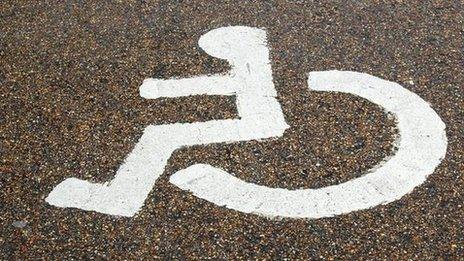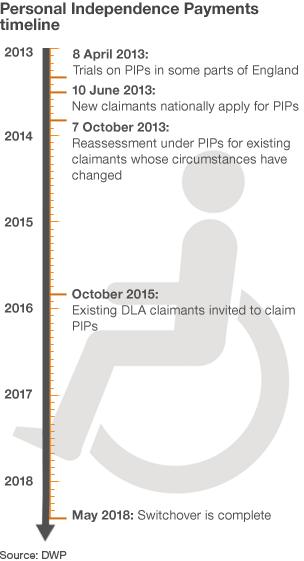Disabled benefit delays unacceptable, say MPs
- Published

More than three million people claim disability living allowance
MPs have said it is unacceptable that disabled and sick people have to wait six months or more to find out if they are eligible for benefits as a result of government changes.
The Commons Work and Pensions Committee said delays to decisions about the new personal independence payment (PIP) were causing stress and uncertainty.
They also questioned the language used by ministers and the use of statistics.
Ministers acknowledged the delays but said benefits were being backdated.
New claims for the personal independence payment (PIP), the replacement for the disability living allowance (DLA), began in April 2013. They are worth between £21 and £134 a week.
Most people applying for PIP have a face-to-face assessment to determine eligibility, which is carried out by the private contractors Atos Healthcare and Capita Business Services.
'Financial difficulties'
In a report last month, the National Audit Office found claimants were waiting an average of 107 days, and terminally ill patients 28 days, for a decision on their cases - much longer than had been predicted.

Some of the claimants affected by these delays are people with terminal illnesses.
Labour MP Dame Anne Begg, who chairs the cross-party committee, said any delays were regrettable but the time that it was taking in such cases was "completely unacceptable".
The MPs say the average time taken to process new cases should be reduced to the expected 74 days, and seven days for terminally ill people.
Dame Anne said basic failures - such as appointments being cancelled without notice or unsatisfactory responses to queries about claims - were happening too regularly and claimants had often been unable to get any information about when a decision would finally be made.
"This not only leaves people facing financial difficulties whilst they await a decision, but causes severe stress and uncertainty," she said.
"It is vital that all disabled people, but especially the terminally ill, experience as little delay and stress as possible in making a claim."
Ministers, the committee added, should consider invoking penalty clauses in their contracts with Atos and Capita if the "current dire situation" did not significantly improve.
"By the end of last year, decisions had been made in fewer than 20% of new claims submitted since April 2013," Dame Anne added.
"It is essential that the backlog is cleared before the limited natural reassessment of existing DLA claims is extended any further."
Macmillan Cancer Support said the time being taken in many cases was "appalling" and the government must agree to publish waiting times for decisions on a quarterly basis.
Scope said the benefit was a "financial lifeline" for disabled people to reflect the extra costs they incurred in performing basic tasks.
'Fast-tracked'
The introduction of personal independence payments is one of a series of major welfare changes being pursued by the government aimed at reducing the benefits bill and encouraging greater self-reliance and incentives to work.
But the committee said ministers must "exercise care" in the language used in press releases about these benefit changes and how they present statistics about their impact so as not to "feed into negative public views about benefit recipients".
"Statistics should be used to shed light on policy implementation, not to prop up established views or feed preconceptions," the report added.
"The Department for Work and Pensions should set out the specific steps it is taking to ensure that statistics are released in a way which is accurate and fair to benefit claimants."
In response, the Department for Work and Pensions said PIP was a new benefit, based on face-to-face assessments and regular reviews.
"In some cases this end-to-end claims process is taking longer than the old system of Disability Living Allowance, which relied on a self-assessment form," a spokesman said.
"We are working with providers to ensure that all the steps in the process are as smooth as they can be and the benefit is backdated so no-one is left out of pocket."
Claims by those with terminal illnesses were fast-tracked, the department added.
"Latest statistics show over 99% of people with terminal illnesses who have applied have been awarded the benefit, which means over 9,500 terminally ill claimants are now receiving PIP."